Post-Roe America: One state’s fight over abortion access and where it’s taking women and advocates
This story is the result of a collaboration between the Austin American-Statesman and USA TODAY for the purpose of producing the first episode in the new series “States of America.” The last names of the women seeking abortions were not used at their request because of the personal nature of their choices. The full episode of “States of America” exploring the abortion landscape in Texas will premiere at 9 p.m. EDT July 9 on the USA TODAY NETWORK’s streaming channel. For a full list of platforms offering our FREE streaming channel, follow the link here.
DALLAS — The sky was still dark when the women began to gather at the First Unitarian Church of Dallas.
They arrived one by one and were shepherded from the parking lot to a meeting area inside the church by volunteers from the congregation, each of whom had spent days preparing for this moment.
“I’m here to help you,” said one volunteer, offering her hand to a woman getting out of a car. “I’ve been in your shoes before.”
It was early, just after 5 a.m. The streets were deserted, save for the few cars headed toward the church.
Whether it was the early hour or anticipation for the journey ahead, the women were quiet as they waited for the rest of their travel companions to arrive. Some nervously bounced their knees under a table while others rested their heads on their arms, avoiding eye contact with the circling volunteers who offered snacks and cups of juice.
When the group boarded a bus bound for the airport, there were 15 travelers, plus a mother accompanying her daughter.
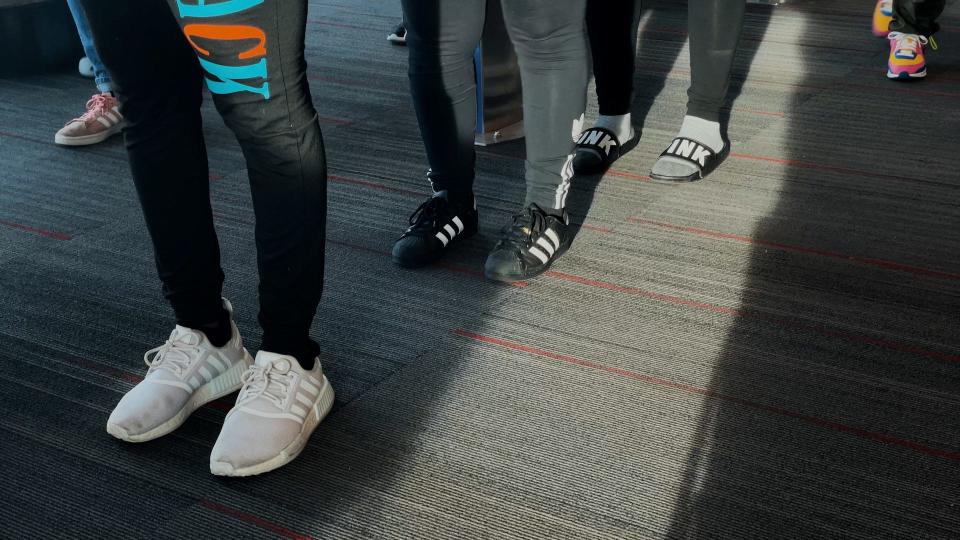
Besides the familial pair, none of the women who gathered at the church knew any of the others. They were different ages and ethnicities, with varied personal backgrounds and professional histories. Some were college students, while others owned businesses or were newly unemployed. Several were parents, with young children and teenagers at home. Many of the women were from Dallas, but others hailed from farther reaches of the state, and at least one had traveled to the church from Oklahoma.
But they all had at least one thing in common: Each was more than six weeks pregnant and could not have a legal abortion in Texas.
“My biggest fear in life is to not have any options, and I feel like somebody who doesn’t even know me took my options away from me, and it makes me furious,” Amber, 26, said in an interview.
When her doctor at the Southwestern Women’s Surgical Center in Dallas told Amber she could not have the abortion she sought, she started to cry.
“I was a couple days after what the law said I would have to be to get an abortion,” she said. “That made me even more upset because, dang, a couple days?"
She thought of her future, and the life she was building for herself. She thought about the frequent doctor's appointments a pregnancy would entail and her lack of health insurance, after aging out of coverage under her parents’ plan. She thought about the recent mass shooting at an elementary school in Uvalde, where 19 children were killed, and what dangers a future with a child might entail.
Then, her doctor said there was one spot left in a travel program facilitated by a local church, a nonprofit and abortion funds in Texas that would allow her to travel with a group of women from Dallas to New Mexico to have legal abortions — free of charge.
“I think we all low-key thought we were going to get kidnapped,” she said, speaking of her fellow travelers. “But what other choice did I have?”
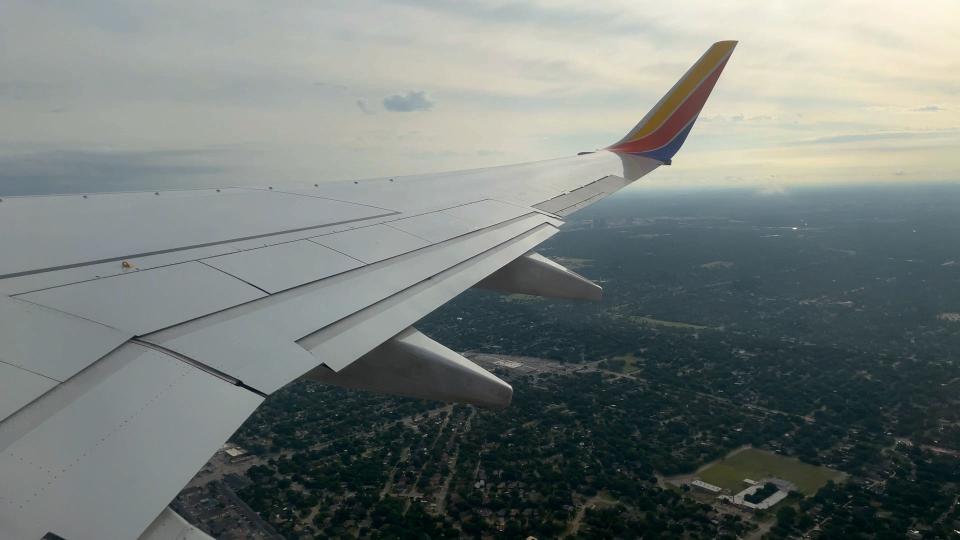
Anti-abortion activists target small town
Nearly 90 miles away, Preston Pulley clasped his eldest daughter’s hand before bowing his head in prayer and asking God to permanently end abortion in Athens, the East Texas town where he was raised.
His family was among a group of 10 worshippers huddled near the site of what anti-abortion activists consider the first illegal abortion operation in Texas: a family practitioner’s office that once sat on Richardson Street and has long since closed. The exact location of the former practice eluded the group, so they settled for a quiet stretch of sidewalk in the general vicinity for their gathering.
“We come together and speak for those who cannot speak for themselves,” Pulley said in his prayer. “We humble ourselves before you, and we pray that we are able to locate historically where these atrocities took place and that we find healing through you, through your son Jesus and that those involved return to you.”
In the 1960s, Dr. Curtis Boyd started performing illegal abortions out of his family medicine office in Athens through the Clergy Consultation Service on Abortion, a national religious organization that sought to connect people seeking abortions with doctors willing to provide care.
The arrangement didn’t last long. Boyd ultimately left Athens and opened a clinic in New Mexico, where abortion was permitted in certain circumstances. In 1973, after the U.S. Supreme Court issued its Roe v. Wade ruling, Boyd returned to Texas and opened the state’s first legal abortion clinic in Dallas. He went on to establish the Southwestern Women’s Surgery Center and its sister clinic in New Mexico.
It has been decades since Boyd performed abortions in Athens, and no other abortion clinics have opened in the city in the intervening years. But that’s exactly why anti-abortion advocates are pushing to make Athens, a little more than an hour southeast of Dallas, the latest Texas city to outlaw abortion and become a “sanctuary city for the unborn.”
“Passing an ordinance here is so important to so many in the community because they believe it is a way to reclaim the history of Athens, that this is a community of life, not a community of death,” said Mark Lee Dickson, the 36-year-old pastor behind the ordinance who serves as a director of Right to Life of East Texas, an anti-abortion advocacy group.
Dickson has spent years bouncing between small Texas towns in his quest to outlaw abortion in Texas, one city at a time. So far, 42 communities in the state have adopted such an ordinance, either through local city councils or by way of a ballot initiative. There was an abortion clinic operating in just one of those cities when the ordinance was passed.
Most measures drew legal challenges for violating federal abortion protections, but courts largely allowed them to remain in effect. Dickson’s effort has taken on new meaning in the wake of the Supreme Court’s decision late last month to overturn Roe v. Wade and return the issue of abortion restrictions to state legislatures.
Texas is set to implement a near-total ban on abortion in the coming weeks, under a so-called trigger law approved by lawmakers last year that makes performing an abortion a felony.
“Unless something changes dramatically at the state level or the federal level, Athens can make this kind of law,” said Charles “Rocky” Rhodes, a constitutional law professor at South Texas College of Law. “They end up becoming more of symbolic declarations of support, rather than of any real legal import.”
But Dickson said these local ordinances will ensure that, should leadership at the state or national level change in the future, communities that are opposed to abortion can still have a voice.
“I believe I'm on the winning side, but there's more battles to be fought,” he said. “We are always going to have to fight for life and we're going to have to make sure that those in our communities that represent us truly do represent our beliefs and values.”
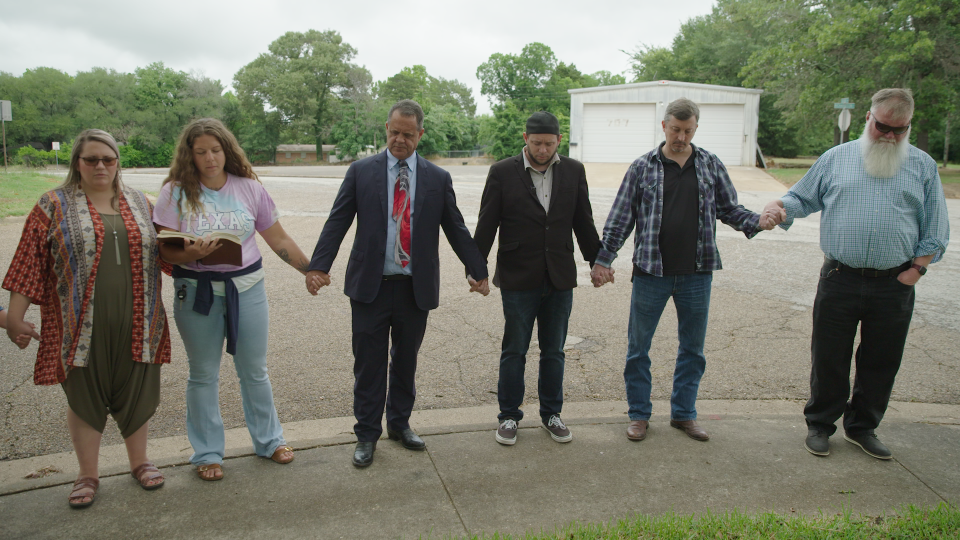
Religious partnership orchestrates travel to New Mexico abortion clinic
The Rev. Daniel Kanter knew that it was highly likely the women gathering at the First Unitarian Church of Dallas would be scared.
He had been organizing travel programs for women seeking abortions since December, offering free transportation and medical appointments to patients with incomes under the federal poverty line through a partnership with the New Mexico Religious Coalition for Reproductive Choice.
In a meeting with volunteers four days before the departure of Amber’s group, Kanter warned that the women participating in the program are often fearful when they arrive, worried about the law in Texas and worried about the program itself.
“No one owes us anything; not their story, not their thanks, not their acknowledgement and not their smile,” Kanter said, addressing the group of volunteers. “In some cases, we’re dealing with people who carry trauma and are primed not to trust us, so we need to present our most direct and gentle selves.”
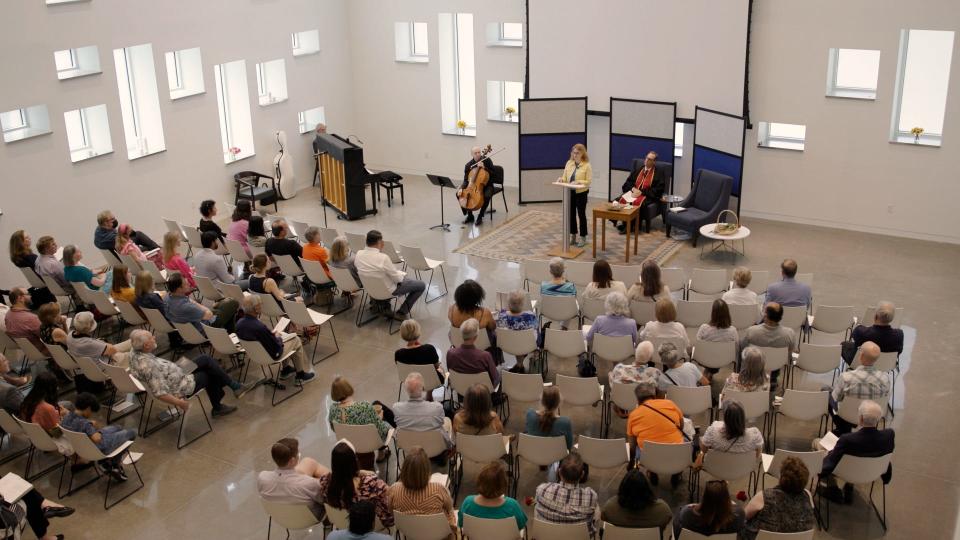
He reiterated that the program is legal for now, as long as abortion remains legal in New Mexico and lawmakers in Texas don’t attempt to restrict residents’ ability to travel elsewhere for a procedure.
In September, Texas lawmakers implemented a law that all but banned abortion, prohibiting the procedure after six weeks of pregnancy. In the past 10 months, women have been forced to carry unwanted pregnancies to term or cross state lines to have a legal abortion. Their options to go elsewhere narrowed in May, when the Oklahoma Legislature banned abortion with few exceptions in that state.
People with unwanted pregnancies will now face similar dilemmas in broad swaths of the country, after the Supreme Court ended nearly 50 years of federal constitutional protections for abortion.
States across the country have taken steps to ban or severely restrict access to abortion in the wake of the decision, including Texas, Oklahoma, Louisiana, Arkansas, Mississippi, Alabama, Georgia, South Carolina, Tennessee, Kentucky and Florida in the South.
Reporters with the Austin American-Statesman and USA TODAY followed the travel program in early June, before the court's ruling on Roe v. Wade. All of the interviews conducted in this piece occurred prior to the decision.
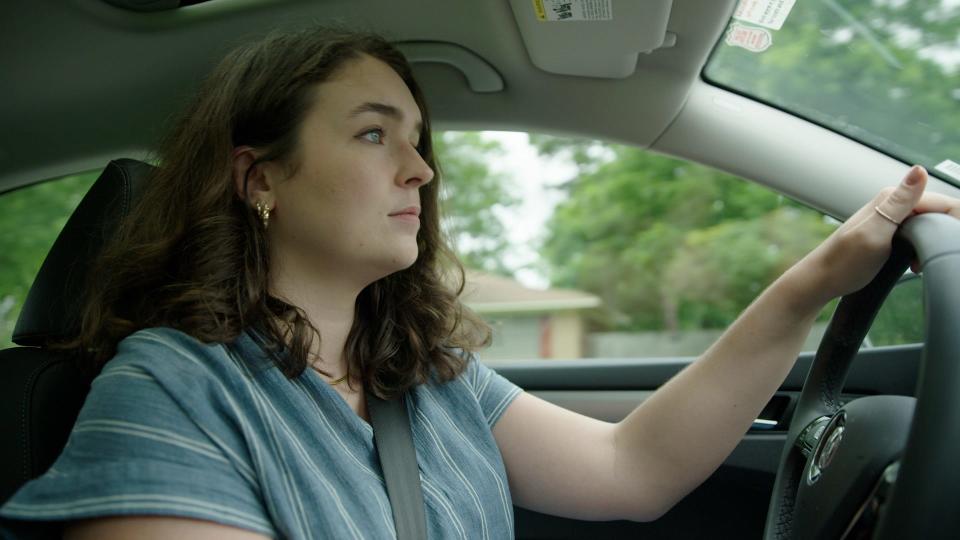
Kanter said he plans to continue with his travel program for as long as he is able. He anticipates that demand will grow after the Supreme Court's action.
The program runs through a partnership with Kanter’s church, the New Mexico Religious Coalition for Reproductive Choice, the Southwestern Women’s Surgery Center in Dallas and its sister clinic in Albuquerque, N.M., Southwestern Women’s Options.
The partnership was built on the foundation of a multifaith chaplaincy program Kanter started with the Southwestern Women’s Surgery Center in Dallas six years ago. Different religious leaders would spend time at the clinic, offering counseling to patients and a space to share their stories as they made decisions about their future.
Religious organizations are often associated with the anti-abortion movement, but not all people of faith share that perspective, Kanter said. His own church has long-standing ties to the abortion rights movement dating back to the Roe v. Wade decision.
"It's important for people to be reminded that not all their pastors, not all their preachers, not all their rabbis are against them," Kanter said in an interview. "It’s a disconnect to be sitting in a church like this and to have had an abortion and to hear your pastor telling you that you are somehow a sinner or are unredeemable. Our religions should be talking about how we love each other. That’s the core of all religion, and pastors who perpetuate that shame are creating really a kind of emotional violence against the women in their congregations."
When the six-week Texas abortion ban known as Senate Bill 8 took effect, the chaplaincy program morphed into a travel program. People traveled to the clinic in Dallas to determine how far along their pregnancy might be. If they were past six weeks of pregnancy, wanted to have an abortion and met certain income requirements, they were directed to Kanter’s program.
“These are the poorest people in our communities,” Kanter said. “They just don’t have the resources to navigate themselves to get an abortion in another state, and they don’t have the resources to carry that prenate to birth.”
Origins of latest abortion restrictions, laws in Texas
To hear Dickson tell it, the movement to outlaw abortion in Texas city by city was born in 2019 in the parking lot of an East Texas Chick-fil-A.
Republican-led states were passing sweeping bans on the procedure in the hopes of drawing a legal challenge from abortion providers and creating a vehicle for the court’s conservative majority to overturn Roe v. Wade.
Dickson had been working with city leaders in Waskom to adopt a measure that would prevent an abortion clinic in nearby Shreveport, La., from moving its operations across state lines after legislators there passed a law that forced many clinics to close their doors.
The Louisiana law ultimately was overturned by the Supreme Court — but not before Dickson persuaded the City Council in Waskom to pass an ordinance banning abortion within city limits.
“I remember staring at that ordinance and I was thinking: I’m not an attorney. I don’t want to see this city sued into oblivion,” Dickson said, describing his thought process as he sat in his car outside the fast-food chain. “So I texted my senator, Sen. Bryan Hughes.”
Hughes, a Republican from Mineola, initiated a conference call with Dickson and Jonathan Mitchell, the former solicitor general of Texas. The men told Dickson about their idea for a new state law that would prohibit most abortions and had the potential to withstand legal challenges, despite federal constitutional protections for abortion.
They suggested that Dickson employ their strategy in the Waskom ordinance and introduce a private enforcement mechanism for the abortion ban that would allow individuals to sue anyone who facilitates an illegal abortion.
This idea was the basis for Senate Bill 8, which allows private individuals to sue over illegal abortions. State and federal courts ultimately allowed the law to stand.
Soon, small towns across the state started passing similar ordinances under Dickson’s tutelage. Most faced legal challenges, but they were permitted by courts to keep their restrictions on the books to a certain extent.
The first true test of the ordinance came in 2021, when the Lubbock City Council rejected the ordinance due to concerns about the legal precedent it would establish. It was the first time an ordinance was being considered in a city with an abortion provider; a Planned Parenthood clinic had opened in Lubbock in 2020.
Dickson and other activists gathered enough signatures to put the measure on the ballot and Lubbock residents voted 62% in favor of the ordinance.
“The importance of these local ordinances is that we never know what leadership is going to do. We don’t know if our leadership is going to pull an Austin, Texas, and say, ‘We’re going to put this at the lowest priority level,’” Dickson said. “There is a need to make sure private enforcement at the local level is on the books so we can hold the abortion industry accountable.”
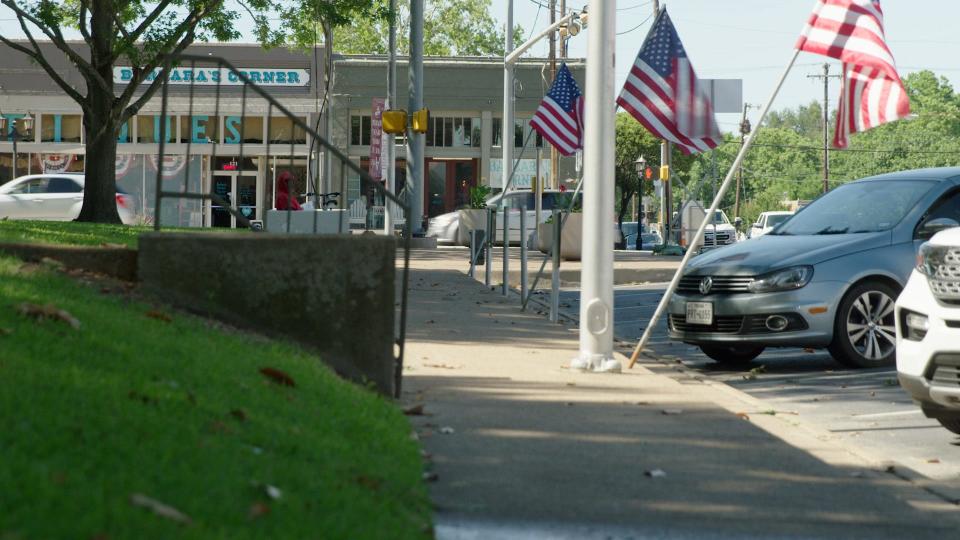
The proposed ordinance in Athens is different than many of the prior ordinances adopted in Texas towns, because of its addition of a section that seeks to prohibit any Athens resident from obtaining an abortion outside city limits.
“It shall be unlawful for any person to knowingly aid or abet an abortion performed on a resident of Athens, Texas or to attempt to aid or abet such an abortion, regardless of where the abortion is or will be performed,” the proposed ordinance reads.
This is broader in scope than past efforts, which have been limited to abortions performed within city limits, but it echoes calls from some state leaders to adopt a similar restriction for Texas residents in the future.
“The local laws on this rise and fall on what the state is doing,” Rhodes, the South Texas College of Law professor, said. “If state law prohibits abortion everywhere, it doesn’t really matter that Athens is prohibiting you from getting an abortion anywhere in the state. But on the other hand, those laws could be important and come into play if the state has a change of heart on abortion regulations — which isn’t going to happen anytime soon.”
Arriving in Albuquerque, women seeking abortions find help
When the group of 15 women landed in New Mexico, more volunteers were waiting in their cars outside the airport.
About half of the women were taken directly to the clinic, where most were scheduled to receive surgical abortions. The others weren’t due at the clinic until the afternoon, when they would receive the first dose of their medication abortion regimen.
Volunteers drove the second group to the New Mexico Religious Coalition for Reproductive Choice’s headquarters in downtown Albuquerque, where rooms were set up in anticipation of their arrival. In the main gathering space, a table was piled high with snacks and breakfast foods, alongside a fully stocked fridge with sodas and other drinks. Another table held jigsaw puzzles, activity books and coloring pages to help pass the time.
There were black office chairs spread throughout the space, including in a dimly lit room toward the back of the office, where a television was playing on low volume. As the women took their seats, they started to speak with one another, discussing their experiences with morning sickness, the plane ride and details about their lives.
“I feel like we were all kind of quiet and just not feeling good, but we all started talking to each other and realizing that we’re going through the same things, kind of,” said Desiree, 22. “It’s like you’re not alone.”
Desiree found out she was pregnant the same day she learned that she would be able to return to college in the fall, and she immediately started to panic. She pulled out her phone and called multiple clinics and crisis pregnancy centers in her area, trying to get an appointment for a sonogram.
She found herself at a crisis pregnancy center, which promotes alternatives to abortion, where she was told she was too early in her pregnancy to have a sonogram. But a week later, she visited the Southwestern Women’s Surgery Center in Dallas and learned that this was not the case. In fact, a sonogram revealed that she was too far along to have an abortion in Texas.
“I probably could have gotten a sonogram done earlier, and I could have avoided all of this,” she said. “I was really hard on myself because I was like, 'I waited too late.' I should have been more on it and doing better research on the clinics I was going to.”
She grew up the oldest of six children, and their parents were in and out of their lives, leaving many child care duties to Desiree and her brother. The experience gave her a deep appreciation for the responsibility of parenthood and made her question whether she wanted children of her own.
When she learned about the travel program, Desiree said she signed up immediately, even though she was apprehensive about traveling with a group of strangers to have an abortion.
“I know my other options were going to be harder,” she said.
Keyara, 25, felt the same way. She already had three children at home — a 5-year-old, a 4-year-old and a 6-month-old — and the prospect of trying to coordinate her own travel to another state to have an abortion was daunting.
But the prospect of having a fourth child felt impossible.
When Keyara found out she was pregnant with her second child, months after giving birth to her first, she was homeless and experiencing domestic violence in her relationship. She went to a clinic in the hopes of having an abortion, but she couldn’t pull together enough money and decided to continue her pregnancy.
This time, she has a roof over her head and a small support network of close relations who help care for her young children. But she still did not want to have another child.
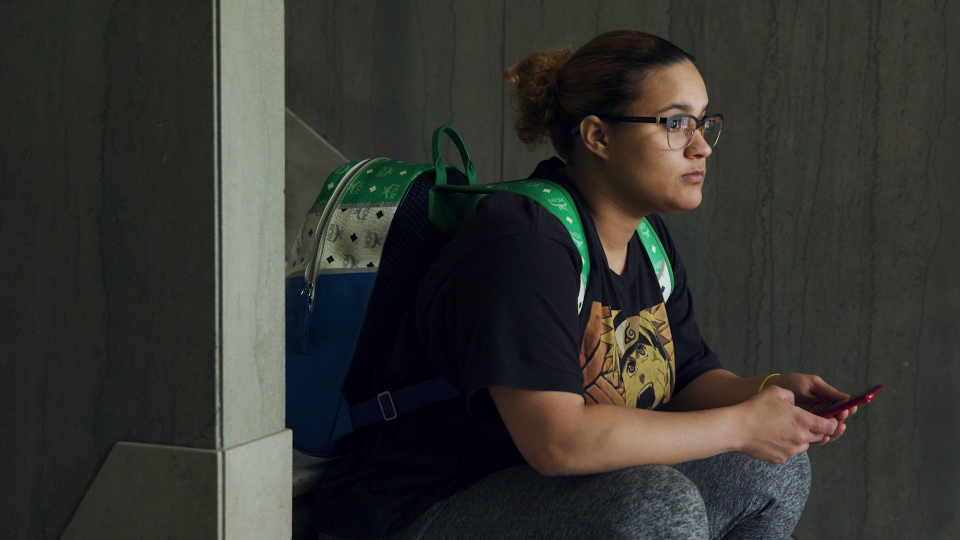
“I didn’t want to have two children under the age of 1 again,” she said. “I love my children, but I just don’t want to have to deal with having the worry of feeding another mouth with the shortage of Similac and having to deal with that kind of stress.”
“I probably would have been one of those girls who probably tried to self-abort, just because I know at this very state that I am not prepared to have a fourth one,” Keyara said.
She had heard stories about friends of friends who tried to end their pregnancies by drinking a cap of bleach or taking a large dose of vitamin C. She had also seen message boards online of people talking about different strategies for ending pregnancies that are not approved by the Food and Drug Administration.
“Obviously, if it wasn’t something serious, a woman wouldn’t be risking her life to take something away that she knows at the moment she either can’t take care of, can’t provide for or she’s just not ready to be a mother yet,” she said. “It’s your life. If you’re not ready, you’re not ready, and no one should force you to be ready.”
Not everyone is Athens wants further limits to abortion rights
Dickson and his supporters believe they’ll find a receptive audience for their effort in Athens, a staunchly Republican community of 13,000 people that former President Donald Trump won by 60 percentage points in 2020.
But Athens city officials have resisted calls to ban abortion via city ordinance, citing legal concerns about permitting residents to sue one another over the procedure. Supporters of the effort are now working to collect enough signatures to put the measure up for a vote later this year.
“I’m deeply concerned about the precedent that it sets in the state and in this country,” Mayor Toni Clay said of the ordinance. “When the government says, 'We want you, the citizens, to go after one another'? That’s never good.”
Clay was raised in Athens and worked as a journalist at the Athens Daily Review before deciding to run for a City Council seat. She became the mayor in 2021.
She says she hears from constituents about the issues that matter most to them, whether that be a problem with their water supply or a dangerous dog they saw in the neighborhood. It’s rare that a constituent contacts her to discuss the sanctuary city effort, she said.
Her opposition to the ordinance has been rooted in advice from the city attorney, who she said advised City Council members that the ordinance is “not well written and is not good governance.”
Clay has resisted discussing her personal position on abortion during the debate, as she sees it as outside her purview as a city representative.
“One of the concerns I have is the use of wedge issues so that people who have absolutely no governing authority on a particular issue suddenly have to be able to check off boxes and answer a list of questions in a particular way in order for some unnamed entity to give them a stamp of approval,” Clay said in an interview. “City government in particular is about can we balance the budget, can we fill potholes, can we ensure that people have front-line services and clean water? And as long as we’re doing that, the list of wedge issues that have nothing to do with city governance have no place in the conversation, in my opinion.”
Should city residents ultimately vote to adopt the ordinance, Clay said she hopes it will not change the fabric of the community and that Athens will remain “a community where neighbors help one another.”
“The best thing about Athens is its people,” she said of her hometown. “It’s a deeply faith-oriented community. It’s a deeply caring community. If you put out a call that a family or an organization needs help, it takes very little time to have people answer that call. It’s just a wonderful place.”
Churches are situated every few blocks in Athens, where businesses shut down on Sunday and it's hard to find anyone who isn’t gathering at a place of worship. Most are evangelical, part of a Christian movement behind the effort to end abortion in the United States.
But not all of the religious leaders in the community are supportive of Dickson’s ordinance.
Pastor Seth Davidson, who has led the congregation at St. John Lutheran Church in Athens for eight years, said a blanket ordinance would complicate the pastoral care he is able to offer to his congregants.
He said once a woman approached him before worship and asked, “Can I be a Christian and have an abortion?”
“If I say yes, what are the consequences? She could make a decision one way or another, good or bad,” Davidson said. “If I say no and she’s already had it, I could be giving her a sentence of eternal damnation in her mind.”
So his answer was to invite her to lunch after worship, and talk through her circumstances and feelings so she could find support from her church — instead of isolation.
“We need to be the solution,” he said. “Unfortunately, religious leaders have allowed their pulpits to become political pundits instead of a place where Christ is preached in its fullness, which means grace, which means God’s gifts given to his people. If we approached it in that way, we could be a huge solution to the community instead of becoming a problem.”
Road to recovery
As the second group of women made the trip from the New Mexico Religious Coalition for Reproductive Choice’s office to the clinic, the first group started to return from the morning appointments.
Some of the women were nauseated and went to lie down in a private room down the hall from the main gathering space. The lights there were off, and instrumental meditation music played as they found places to relax on yoga mats, cushions and an exercise ball.
Next door, a volunteer offered massage treatments to each returning patient. She taped up a large poster board in the hallway, encouraging women to write their names and reserve a time slot.
In another room, three women gathered around a table to eat lunch after returning from medication abortion appointments at the clinic earlier in the day.
Amber, Desiree and D.A., 22, nibbled on sandwiches and swapped stories about their lives.
D.A., a college student, said she was worried about managing her recovery when she returned home. She had kept her pregnancy and subsequent abortion a secret from her parents, and she struggled to find support from her friends.
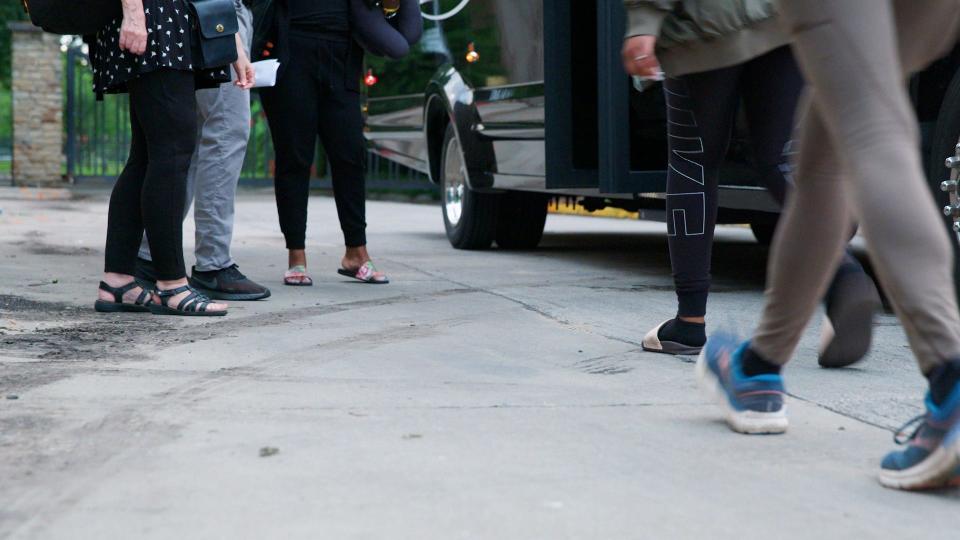
“I told my best friend yesterday, and she acted like it was fine, and then later on I asked if they could stay with me over the weekend, and she told me that she’s not comfortable because it’s a life and I’m hiding it from my parents,” she said. “Are you saying that’s more important to you than being with me while I’m going through this? Even though I felt confident about my decision because I know this is what I needed to do, I began to feel so emotionally weary.”
Her first abortion came before the Texas law banning most abortions. She was a victim of sexual assault and became pregnant after the encounter. After some consideration, she decided that she wanted to have an abortion.
“Once you get done and you get through the pain, it still lingers,” Amber said. “After the first, I would always think, ‘Wow, I would have been a mom right now. My kid would have been this many months, and me and my boyfriend would be doing this.’ It’s still hard to think about.”
Even though it was before the state’s restrictive law was adopted, she described the stigma she sees around abortion, regardless of the circumstances.
“There were people outside (the abortion clinic), and they were yelling at me telling me that I was murdering my baby and how I’m a bad person,” Amber said. “I just thought, ‘If you knew my story, you would know that a bad person did this to me.’ I didn’t ask for this. It wasn’t because my skirt was too short, it wasn’t because I wanted to be pregnant by somebody other than the person I was with for multiple years, like somebody saw something they wanted from me, and they took it without my permission.”
Amber agreed and said her mental health has suffered during her pregnancy. She started going to therapy twice a week to help make sense of her feelings about ending her pregnancy — and reminders of the first time she chose to have an abortion.
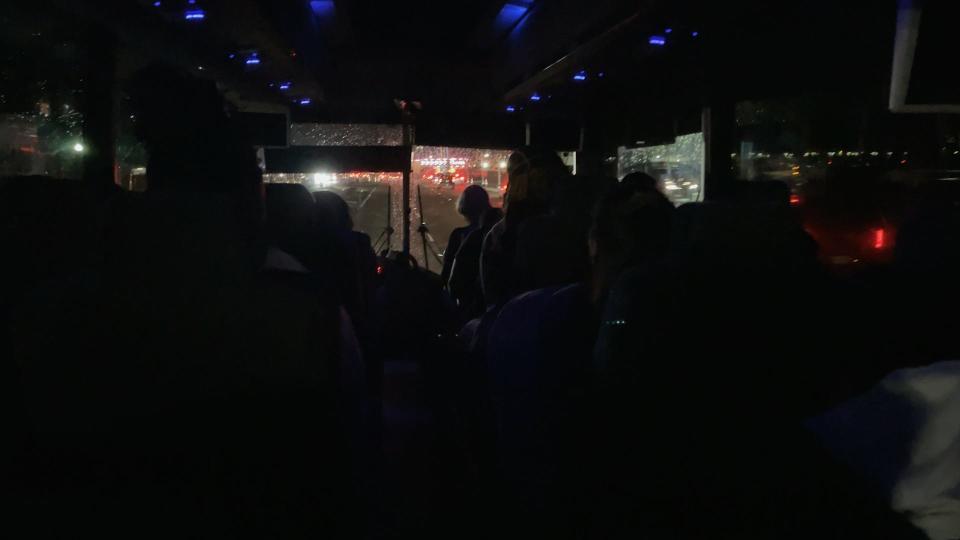
The women were quiet as Amber wiped tears from her eyes, offering somber smiles and nods of affirmation as she discussed her experience.
“I’m just thinking back to all of those moments where I sat by myself on the bathroom floor, crying and questioning why this is happening,” D.A. said. “I felt like I was just getting my life together, and then everything crashed. When you come here, it’s like I’m not the only person going through this. There’s so many people going through their own hardships, and we all have to help each other. It’s not like we all started talking to each other immediately, but as we went through the day, we started opening up to each other and realizing that we were going through similar situations and having similar struggles, in a process where you’re made to feel so alone.”
Soon, the women would climb once more into the waiting cars of volunteers and make their way back to the airport, closing out a long, physically and emotionally draining day.
After their flight, the sky was dark when the women boarded a bus bound for the First Unitarian Church of Dallas.
They would arrive back at the church roughly 16 hours after their initial arrival, but this time they knew what to expect. They were all exhausted and eager to return home.
Some had exchanged contact information in the hopes of staying in touch. Kanter invited them all back to the church for a future service.
“When I found out this was through a church, I was very surprised,” Amber said. “I was scared that it was going to be really dim and bleak and scary, and it was the complete opposite. I was shocked to see a congregation that treated choice the way they did. I’m going to come back.”
Watch the full episode of "States of America" below on YouTube.
This article originally appeared on USA TODAY: Abortion rights in Texas: Some want ban as law, others seek havens

